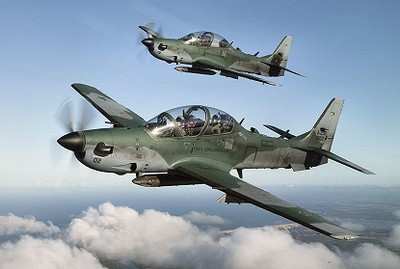Wichita Planemaker Now Shifts Its Focus Beyond The Initial Order
The General Accountability Office (GAO) on Thursday denied Beechcraft Corporation’s protest of the U.S. Air Force contract award to Sierra Nevada Corporation (SNC) and partner Embraer Defense & Security for the Air Force’s Light Air Support (LAS) program. The LAS program is an integral part of the U.S. government’s overall Building Partnership Capacity efforts around the world and immediately supports the development of an indigenous air force in Afghanistan. The program is an element of the U.S. Afghan strategy and essential to the United States’ timely and successful withdrawal from the region.

Under the contract awarded Feb. 27, 2013, SNC is supplying 20 Embraer A-29 Super Tucano aircraft that will be built in Jacksonville, FL, as well as ground-based training equipment, pilot and maintenance training, and logistical support. Delivery of the initial aircraft is scheduled to occur in mid-2014, which allows time for the necessary training before the U.S. withdrawal from Afghanistan.
“Today’s decision is a win for the American warfighters and our allies in Afghanistan who urgently need this light air support capacity to fulfill our mission there,” Taco Gilbert, vice president of Integrated Tactical Solutions for SNC’s Intelligence Surveillance and Reconnaissance business area, said in a news release. “It is also a victory for the American workers who are producing this aircraft. SNC, Embraer and our partners across the United States hit the ground running February 27th, and we will deliver the most operationally capable aircraft on time and at the greatest value to the American public.”
More than 100 U.S. companies in over 20 states, including Elbit Systems, Honeywell International, FLIR Systems, Inc., GE Aviation, L-3 Communications, BAE Systems, Hartzell, PPG Aerospace, Rockwell Collins and Lord Corporation, are part of the supply chain already working to build the A-29 Super Tucano. SNC says that in all, the contract supports more than 1,400 jobs across the United States. “Moreover, this American production operation will continue to produce the A-29 aircraft for other nations as part of the Building Partnership Capacity efforts of the United States, supporting the continued employment of highly talented American workers”, said Gilbert.

In a statement, Beechcraft Corporation said the decision was "distressing," calling the Super Tucano "a more expensive, less capable, foreign-manufactured airplane with weapons and systems unfamiliar to, and outside the control of, the United States military."
"We have known that the requirements for this procurement were written to favor the competition's aircraft. During this protest, we learned that the GAO's review looks only at whether the Air Force followed its process, but not whether the process itself was actually correct or appropriate," Beechcraft said in the statement. "We question whether the Embraer aircraft with its foreign-made weapons can be certified to U.S. military standards in time to provide the mission-capable aircraft per the contract.
"It is now time for Congress to step in and put an end to this flawed acquisition process and limit the purchase of the Brazilian aircraft to only that of the Afghanistan requirement covered by the first delivery order of the LAS contract.
"Beechcraft remains confident that the AT-6, which was rated "Exceptional" by the Air Force, was the better choice for LAS and is the best aircraft for U.S. partner nations in need of light attack aircraft. The company is certain that future procurements, including those run by other governments, will validate this rating and result in the selection of the AT-6 for counterinsurgency and irregular warfare missions."
(Super Tucano (top) and AT-6 (bottom) images from file)
 Aero-News: Quote of the Day (12.11.25)
Aero-News: Quote of the Day (12.11.25) ANN's Daily Aero-Term (12.11.25): Nonradar Arrival
ANN's Daily Aero-Term (12.11.25): Nonradar Arrival Classic Aero-TV: David Uhl and the Lofty Art of Aircraft Portraiture
Classic Aero-TV: David Uhl and the Lofty Art of Aircraft Portraiture Airborne-NextGen 12.09.25: Amazon Crash, China Rocket Accident, UAV Black Hawk
Airborne-NextGen 12.09.25: Amazon Crash, China Rocket Accident, UAV Black Hawk Airborne 12.05.25: Thunderbird Ejects, Lost Air india 737, Dynon Update
Airborne 12.05.25: Thunderbird Ejects, Lost Air india 737, Dynon Update




